 |
Convert OGG to JPG/JPEG Sequence
|
JPG/JPEG is a commonly used method of lossy compression
for digital photography (image). The degree of compression can be adjusted, allowing
a selectable tradeoff between storage size and image quality. JPEG typically achieves
10:1 compression with little perceptible loss in image quality.
OGG to JPG/JPEG Converter Software converts OGG to JPG/JPEG
sequence files. So, you could get every frame image of OGG in
JPG/JPEG format. You can also set output frame rate and JPG/JPEG resolution in
the software. The output JPG/JPEG files look something like the following screen
shot.
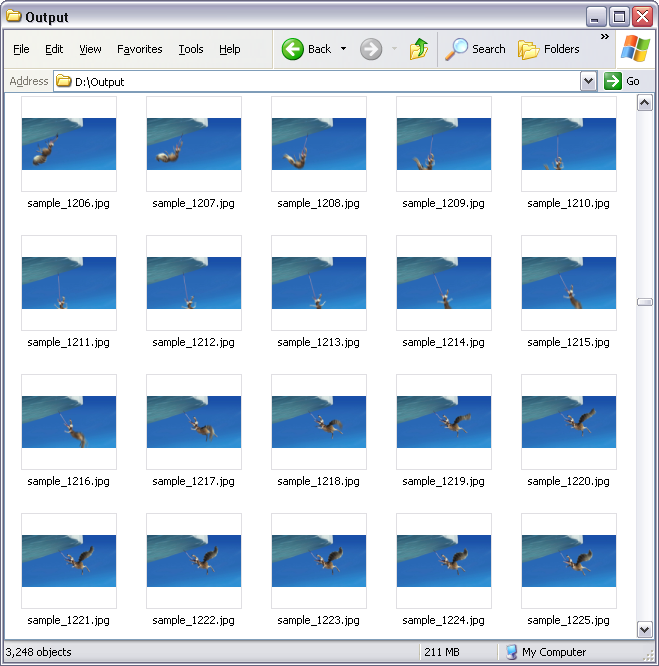
The software also supports other formats and portable devices such as 3G2, OGM, FLAC, Windows Phone, MP2, MPG, WebM (VP8),
etc. The software could convert MKV to SWF, MOD to SWF, 3G2 to PPM image sequence, ASF to MPG, MOD to DV, and so on.
OGG to JPG/JPEG Software supports batch conversion and, is compatible
with Windows 10/8/7/Vista/XP/2000.

What is OGG?
The Ogg format is a free, open-source audio format that provides users
with high-quality audio containing lower bitrates and a smaller file size
than many other formats. The Ogg container format can multiplex a number
of independent streams for audio, video, text (such as subtitles), and
metadata. The creators of the Ogg format state that it is unrestricted
by software patents and is designed to provide for efficient streaming
and manipulation of high quality digital multimedia. Vorbis files (which
have an .ogg extension) compress to a smaller size than MP3 files, which
reduces bandwidth and storage requirements. According to many reports,
Vorbis provides better sound quality than MP3. As of August 4, 2011, the
current version of the Xiph.Org Foundation's reference implementation,
is libogg 1.3.0. Another version, libogg2, has been in development, but
is awaiting a rewrite as of 2008. Both software libraries are free software,
released under the new BSD license. Ogg reference implementation was separated
from Vorbis on September 2, 2000. A serial number and page number in the
page header identifies each page as part of a series of pages making up
a bitstream. Multiple bitstreams may be multiplexed in the file where pages
from each bitstream are ordered by the seek time of the contained data.
Bitstreams may also be appended to existing files, a process known as chaining,
to cause the bitstreams to be decoded in sequence. The OGG file type is
most commonly associated with the audio compression program Vorbis. These
files are typically used to store compressed audio, but can also be used
for video streams. OGG includes a number of separate independent open source
codecs for both audio and video. Due to the fact that this format is patent-free
and fully open ogg's various codecs have been incorporated into a number
of different free and commercial media players.
What is JPG?
JPEG stands for Joint Photographic Experts Group. It is a standard method
of compressing photographic images. We also call JPEG the file format which
employs this compression. Its an image file format i.e a format for storing
images. It also uses compression for reducing the file size of the image.
The compression method is usually lossy compression, meaning that some
visual quality is lost in the process, although there are variations on
the standard baseline JPEG which are lossless. JPEG images are commonly
used for Web graphics and for storing photos taken with digital cameras.
They are usually saved with a .JPG extension. The JPG file is wonderfully
small, often compressed to perhaps only 1/10 of the size of the original
data, which is a good thing when modems are involved. However, this fantastic
compression efficiency comes with a high price. JPEG Stereoscopic (JPS,
extension .jps) is a JPEG-based format for stereoscopic images. It has
a range of configurations stored in the JPEG APP3 marker field, but usually
contains one image of double width, representing two images of identical
size in cross-eyed (i.e. left frame on the right half of the image and
vice versa) side-by-side arrangement. This file format can be viewed as
a JPEG without any special software, or can be processed for rendering
in other modes. A number of alterations to a JPEG image can be performed
losslessly (that is, without recompression and the associated quality loss)
as long as the image size is a multiple of 1 MCU block (Minimum Coded Unit)
(usually 16 pixels in both directions, for 4:2:0 chroma subsampling). Utilities
that implement this include jpegtran, with user interface Jpegcrop, and
the JPG_TRANSFORM plugin to IrfanView.
How to Convert OGG to JPG/JPEG Sequence?
- Free Download OGG to JPG/JPEG
Converter Software
- Install the Program by Step-by-step Instructions
- Launch OGG to JPG/JPEG Software
- Choose OGG Files

Click "Add Files" to choose OGG files.
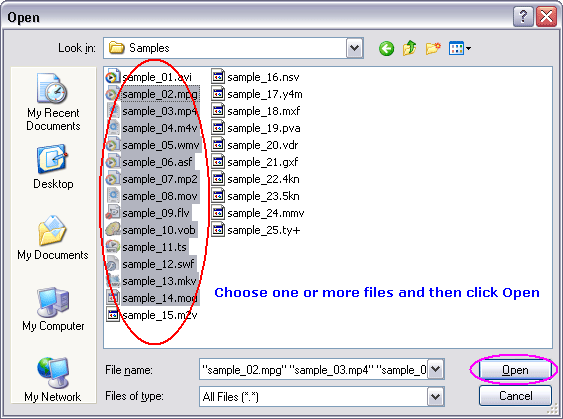
Choose one or more OGG files you want to convert and then click Open.
OGG to JPG/JPEG Software will open OGG files and get file information
of the file such as width, height, frame rate, video bit rate, audio sample rate,
audio bit rate, audio channels, and then display the information of OGG file
at conversion list.
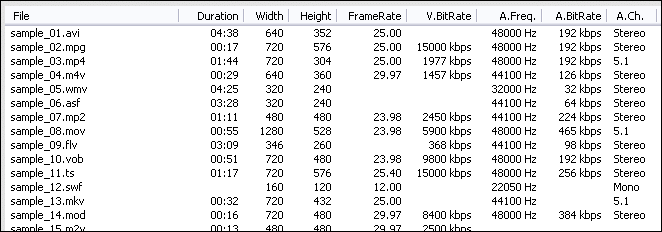
- Choose Output Format
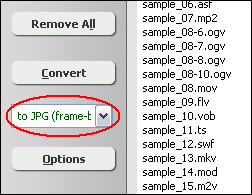
Click on combo-box of output format and then choose "to JPG (image sequence)".
- [Optional, for advanced user]
Set JPG Encoding Parameters
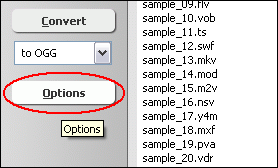
If you want to change JPG encoding parameters such as frame rate, video size,
aspect ratio, and so on, please click "Options".
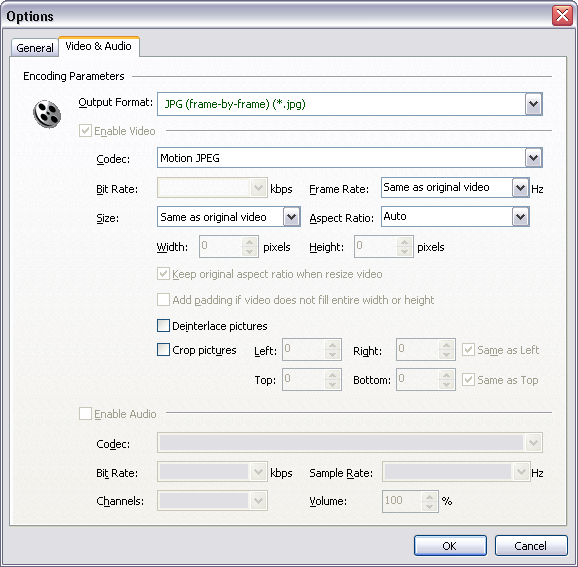
And then, switch to tab "Video & Audio" and choose "JPG
(image sequence)" at "Output Format", and then set options
for image encoding.
- Convert OGG to JPG/JPEG
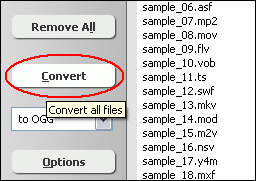
Click "Convert" to convert OGG to JPG/JPEG sequence.

The software is converting OGG files to JPG/JPEG.
- View and Browse JPG/JPEG Files
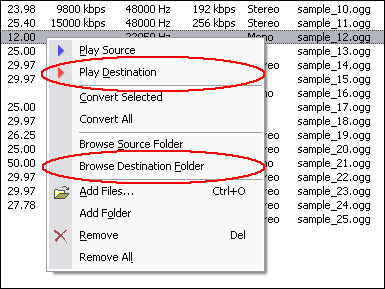
When conversion completes, you can right-click converted item and choose "Play
Destination" to view the first outputted JPG file; or choose "Browse
Destination Folder" to open Windows Explorer to browse the outputted JPG
files.
- Done
Top
OGG to JPG/JPEG Software is 100% clean and safe to
install. It's certified by major download sites.

Convert OGG to JPG/JPEG Related Topics:
|












